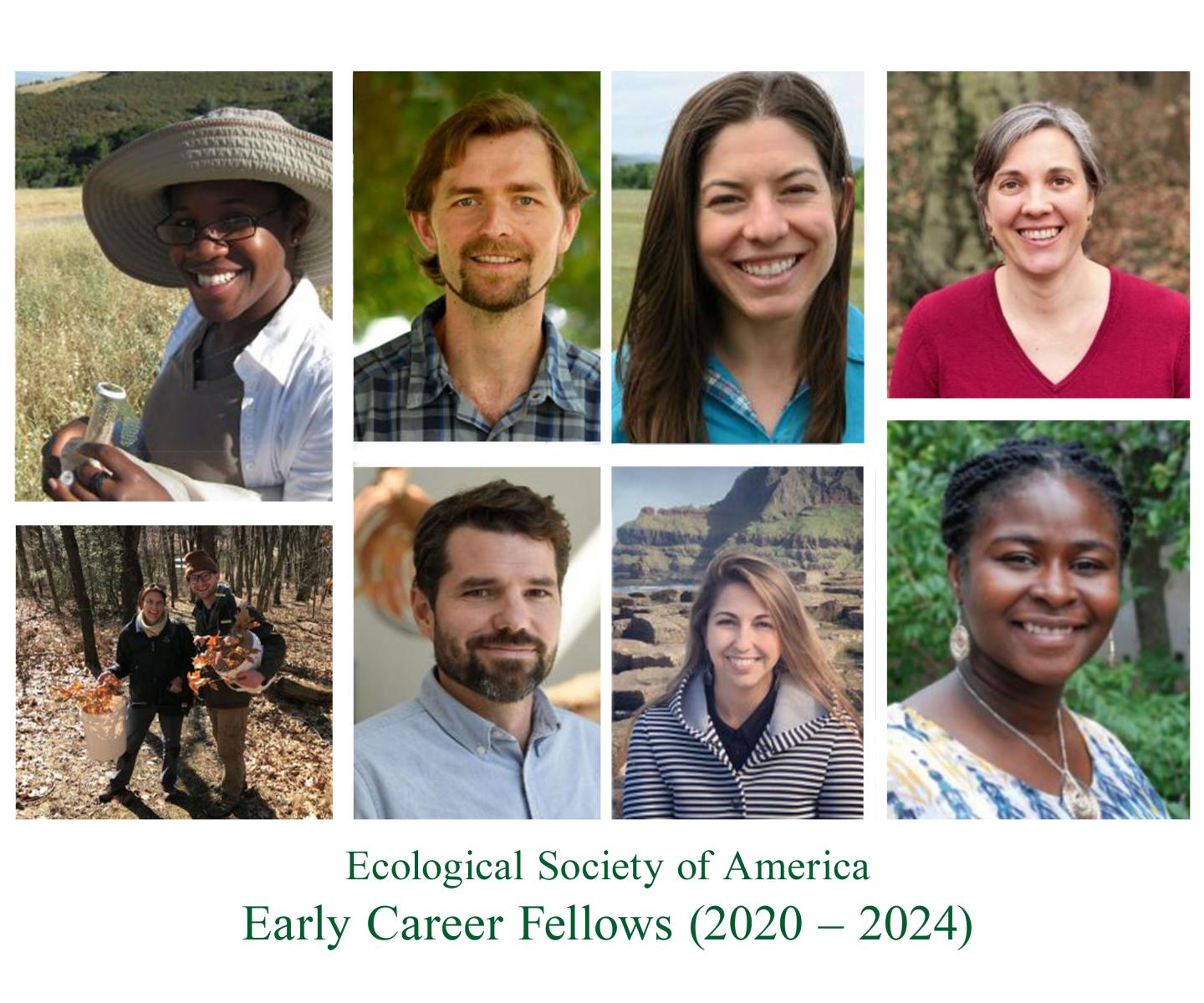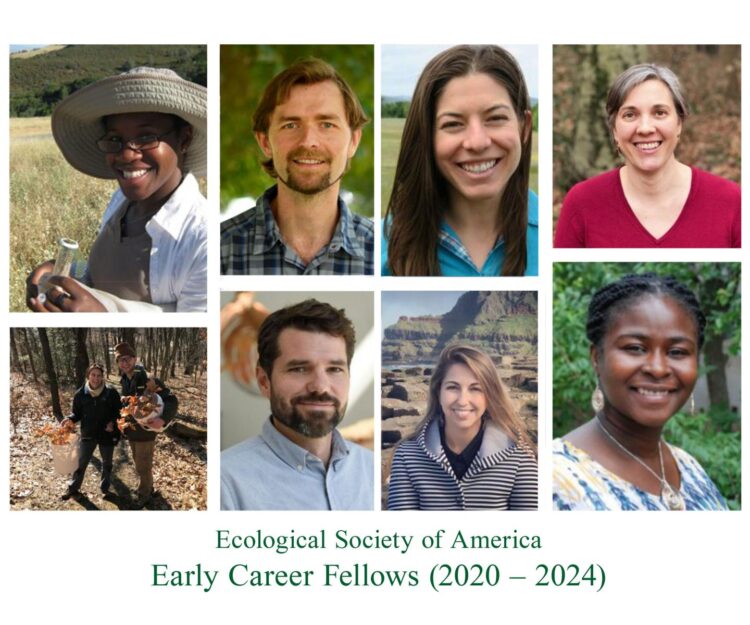
Credit: ESA and 2020 Early Career Fellows
The Ecological Society of America (ESA) is pleased to announce its 2020 Fellows. The Society’s fellowship program recognizes the many ways in which its members contribute to ecological research and discovery, communication, education and pedagogy, and management and policy.
Fellows are members who have made outstanding contributions to a wide range of fields served by ESA, including, but not restricted to, those that advance or apply ecological knowledge in academics, government, non-profit organizations, and the broader society. They are elected for life.
Early Career Fellows are members within eight years of completing their doctoral training (or other terminal degree) who have advanced ecological knowledge and applications and show promise of continuing to make outstanding contributions to a wide range of fields served by ESA. They are elected for five years.
ESA established its fellows program in 2012 with the goal of honoring its members and supporting their competitiveness and advancement to leadership positions in the Society, at their institutions, and in broader society. Past ESA Fellows and Early Career Fellows are listed on the ESA Fellows page.
Fellows elected in 2020 in recognition of their contributions to the science of ecology:
Aimee Classen, Professor, University of Vermont, Rubenstein School of Environment & Natural Resources
Elected for creative leadership and vision for international research collaborations using mountain ecosystems as models for climate change research; for stellar research contributions to the ecology of global environmental change, including how soil microbial diversity shapes ecosystems, biotic and environmental controls on soil nutrient cycling and carbon storage; and for outstanding service.
Ellen Damschen, Professor, University of Wisconsin-Madison, Department of Integrative Biology
Elected for her pioneering research in basic and applied plant ecology, including discoveries about long-term change and how landscape connectivity affects the diversity of ecological communities, and her excellence in teaching and mentoring.
John Drake, Professor, University of Georgia, Odum School of Ecology
Elected for contributions to the understanding of tipping points in ecological and epidemiological systems and the development of computational methods for modeling the spatial distribution of species.
Serita Frey, Professor, University of New Hampshire, Natural Resources and the Environment
Elected for substantial contributions to our understanding of how soil organisms respond to environmental change and in turn impact the services that ecosystems provide across both space and time, leadership within the field of ecology, service to the Ecological Society of America, and tireless mentorship of the next generation of ecologists.
Nicholas Gotelli, Professor, University of Vermont, Department of Biology
Elected for contributing outstanding intellectual leadership in ecology and ecological methodology to the fields of biodiversity science, community assembly, climate change, demography, and species distributions, as well as through his service to the Ecological Society of America.
Benjamin S. Halpern, Professor, University of California Santa Barbara, Bren School of Environmental Science and Management; Director, National Center for Ecological Analysis and Synthesis
Elected for repeatedly transforming ecology and conservation, contributing to understanding of biomass distribution in ecosystems, contributing landmark syntheses of human impacts on the ocean, and developing the Ocean Health Index, which redefined how policy makers approach marine ecosystem assessments worldwide.
Andrew Hansen, Professor, Montana State University, Ecology Department
Elected for fundamentally important contributions in landscape ecology, especially for new insights into how avian assemblages respond to forest landscape structure and management; how patterns of residential development are reshaping rural America and the “New West;” and for advancing conservation of protected areas in the US and worldwide.
Carter Johnson, Distinguished Professor Emeritus, South Dakota State University, Department of Natural Resource Management
Elected in recognition of a long, often-cited record of accomplishment that has involved novel combinations of natural history, landscape dynamics, paleoecology, and ecosystem restoration; and for elucidating the impacts of climate change on prairie wetlands and the effects of streamflow regulation on the Missouri River.
Michael Kaspari, George Lynn Cross Research Professor, University of Oklahoma, Geographical Ecology Group, Department of Biology
Elected for his work bridging macro-ecology, ant biology, and ecosystems ecology that has led to fundamental insights into the contributions of invertebrates to the brown food web and also paved the way for studying biogeochemistry across the periodic table; and for being an inspiring researcher, teacher, mentor, and friend.
Julie Lockwood, Professor, Rutgers University, Department of Ecology, Evolution, and Natural Resources
Elected in recognition of her contributions as a leading invasion ecologist and senior author of the leading invasion biology textbook, and for her voluminous research on patterns, impacts, and management of invasions.
Gary Lovett, Senior Scientist, Cary Institute of Ecosystem Studies, Department of Forest Ecology
Elected in recognition of a distinguished history of contributions to forest ecology, including studies of atmospheric deposition of nutrients and their impacts, and the disturbance of forest ecosystems by invasive pests and pathogens, often leading to significant changes in forest management policy.
Fernando Maestre Gil, Distinguished Researcher, University of Alicante, Multidisciplinary Institute for Environmental Studies “Ramon Margalef”
Elected for outstanding contributions to the ecology of drylands that have illuminated how dryland plant and soil communities are likely to change in a warmer, drier future, and the ecosystem consequences of these shifts; and for fostering truly inclusive, collaborative networks among the dryland ecologists of the world.
Knute Nadelhoffer, Professor, University of Michigan, Department of Ecology and Evolutionary Biology; Director, UM Biological Station
Elected for outstanding scholarly contributions to terrestrial biogeochemistry and to understanding the impacts of global environmental change and human activities on forest ecosystems, as well as to the applications of ecology to management and policy.
Shahid Naeem, Professor, Columbia University, Department of Ecology Evolution and Environmental Biology
Elected for decades of research, writing, teaching, and outreach on the implications of biodiversity for ecosystem function, ecosystem services, and human welfare; and in recognition of his creative insight, his remarkable gift for designing experiments that resolve controversy, and his ability to communicate and persuade, bringing consensus out of conflict.
Yude Pan, Senior Research Scientist, USDA Forest Service, Northern Research Station
Elected for ground-breaking contributions to scientific understanding of forests and global carbon cycling, emphasizing the magnitude and pattern of the forest carbon sink, the importance of reducing tropical deforestation and degradation for climate change mitigation, and the critical role of forest age distributions when addressing disturbance legacies.
Jennifer Powers, Associate Professor, University of Minnesota, Departments of Ecology, Evolution, and Behavior and of Plant and Microbial Biology
Elected for contributions to long-term research that has advanced understanding of global change consequences, ecosystem ecology, restoration, and conservation of seasonally dry tropical forests, a vastly understudied biome, and for training the next generation of tropical ecologists.
Taylor Ricketts, Professor, University of Vermont, Rubenstein School for Environment and Natural Resources
Elected for his contributions to understanding ecosystems and the services they provide for human well-being; his discoveries related to pollination services for crops; and his unique ability to bridge the science and decision-making worlds, ensuring that new knowledge about ecosystems services is used by decision makers in conservation communities and beyond.
Patricia Soranno, Professor, Michigan State University, Department of Fisheries and Wildlife
Elected for her foundational work developing the fields of landscape limnology and macrosystems ecology, her advancement of ecological understanding of lakes at broad spatial and temporal scales, and her positive impacts on the methods, tools, and perspectives researchers use to conduct data-intensive ecology.
Susan Ustin, Distinguished Professor of Environmental Resource Science, Emeritus, University of California Davis, Department of Land, Air, and Water Resources; Associate Director, John Muir Institute of the Environment
Elected for research pioneering the use of remote sensing technology for detecting changes in plant community characteristics, biological diversity, and land use, and for her continued influence on the field.
Diego Vázquez, Principal Researcher, Argentine Institute for Dryland Research, National Council for Science and Technology; Associate Professor, National University of Cuyo, Faculty of Exact and Natural Sciences
Elected for excellence in research on the ecology of species interactions, including the study of dynamics of interaction networks, the functioning and conservation of plant-animal mutualisms, and the ecology of biological invasions.
Mark Vellend, Professor, University of Sherbrooke, Biology Department
Elected for innovative work on the underlying processes of ecological community dynamics, including: the conceptual foundations of community ecology, understanding the nature and consequences of diversity spanning ecology and evolution, and empirically studying the historical changes in plant communities and their diversity.
Don Zak, Burton V. Barnes Collegiate Professor of Ecology, Arthur F. Thurnau Professor, University of Michigan, School for Environment and Sustainability
Elected for his pioneering research and leadership in microbial, ecosystem, and global change ecology that have revolutionized our understanding of how ecosystems acquire and cycle nutrients, and for his outstanding service as a mentor who selflessly supports and enhances the work of others in the field.
Early Career Fellows (2020 – 2024)
Jacob Allgeier, Assistant Professor, University of Michigan, Department of Ecology and Evolutionary Biology
Elected for integrating ecosystem and community ecology to help advance understanding of nutrient dynamics in marine ecosystems and the role of consumers in mediating these processes, and for efforts to apply this information towards the conservation of coastal marine ecosystems.
Meghan Avolio, Assistant Professor, Johns Hopkins University, Department of Earth and Planetary Sciences
Elected for her plant ecology work in grasslands and cities, where she advances novel approaches to studying biodiversity patterns, including focusing on dominant species, rank abundance curves, traits relevant for resident preferences in cities, and genetic diversity.
Carl Boettiger, Assistant Professor, University of California Berkeley, Department of Environmental Science, Policy, and Management
Elected for his emerging leadership in the role of stochastic dynamics in both population ecology and open science.
Lauren Hallett, Assistant Professor, University of Oregon, Department of Biology and Environmental Studies Program
Elected for making fundamental advances in population and community ecology, her effective application of ecological theory and concepts to real-world restoration problems, her adept facilitation of collaborative team science, and her commitment to open science.
Alexandra Harmon-Threatt, Assistant Professor, University of Illinois Urbana Champaign, Department of Entomology
Elected for critically important research in the ecology and conservation of native bee species, and meaningful contributions to training the next generation of ecologists, public outreach, and the enhancing diversity in science.
Nyeema Harris, Assistant Professor, University of Michigan, Department of Ecology and Evolutionary Biology
Elected for her innovative research on the conservation ecology of mammals, her exceptional outreach and community engagement, and her influential work on diversifying the discipline of ecology.
Sara Kuebbing, Assistant Professor, University of Pittsburgh, Department of Biological Sciences
Elected for her research on the impacts of invasive plant species on terrestrial plant communities and ecosystems and for her leadership in applying research to management of invaded ecosystems.
Joleah Lamb, Assistant Professor, University of California Irvine, Department of Ecology and Evolutionary Biology
Elected for transformative environmental research and outstanding contributions to science communication at the interface of ecosystem function and public health, particularly solutions-based research on ecosystem services of tropical seagrass meadows, health of coral reefs, and the role of plastics across Southeast Asia as a pathway to infectious diseases of corals.
###
Learn more about the August 2-7, 2020 ESA Annual Meeting on the meeting website.
ESA invites press and institutional public information officers to attend for free. To register, please contact ESA Public Information Manager Zoe Gentes directly at [email protected]. Walk-in registration will be available during the meeting.
The Ecological Society of America, founded in 1915, is the world‘s largest community of professional ecologists and a trusted source of ecological knowledge, committed to advancing the understanding of life on Earth. The 9,000 member Society publishes five journals and a membership bulletin and broadly shares ecological information through policy, media outreach, and education initiatives. The Society‘s Annual Meeting attracts 4,000 attendees and features the most recent advances in ecological science. Visit the ESA website at http://www.
Media Contact
Alison Mize
[email protected]





